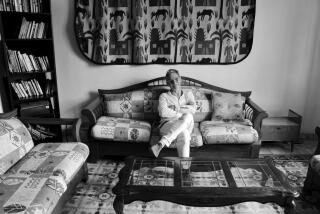Journey Took Explorer Down Mystic Path : YOUNGHUSBAND: The Last Great Imperial Adventurer by Patrick French; Harper International;$30, 440 pages
- Share via
All Tibet wanted was to be left alone. All Francis Younghusband wanted was another adventure, another feather in an already crowded cap. And if Tibet had abundant reason for its posture--the abasement of neighboring India under the British raj could set the rustiest prayer wheel to spinning--so did Younghusband.
A good man, a decent man, a moral man who would have bristled at the suggestion that he was a raging racist, Younghusband believed with all his heart in the white man’s burden. “Higher moral development” allowed--demanded--that Britain “take over the government of the inferior races. . . .” Specifically, the Tibetans were “not a fit people to be left to themselves--a collection of scheming monks and deluded tribesmen who need to learn respect for authority.”
And so the banty Brit elbowed into the Forbidden Kingdom in 1904, armed with indignation (not to mention machine guns and cannon, versus Tibetan spears and slingshots), in what the author calls “the most remarkable and pointless of British India’s military adventures--the Younghusband Expedition.”
It is a pity that Younghusband’s place in history should be dominated by an enterprise that could be called downright goofy were it not so tragic. A far truer measure of the man was his “remarkable (and rare) willingness to change his mind in the light of fresh information. . . .” From an almost parodic product of an all-male upbringing at the zenith of British imperial pomposity, Younghusband evolved not only into one of his country’s most outspoken and influential advocates of India’s independence, but also into a believer in the spirituality of the East as the world’s salvation.
Further, and most intriguing, Younghusband’s was an evolution freckled with far-out philosophies. Founder of outlandish but curiously popular mystical and patriotic movements, Younghusband claimed there was a remarkable race of “extraterrestrials with translucent flesh [living] on a planet called Altair”; heralded the coming of a God-Child, very possibly female, very possibly the fruit of his own active loins and those of a fellow mystic; organized the first four expeditions up Mt. Everest; and set himself up as a champion of free love, this in uptight Edwardian England by a man who had never seen, let alone used, a contraceptive.
Tracing a singularly multifaceted life from “blimpish colonialist” to “premature hippie” with exceptional verve and dedication, Patrick French, a British traveler of 27 summers, has accomplished in his first book a biography equal to the task. His is a penetrating, sometimes judgmental but always affectionate look at the last of a breed, the explorer-adventurer-philosopher in a time when there was still terra incognita on Earth as well as in the mind.
Who--French not least of them--could resist a rugged region ruled by the likes of the Taotai of Kashgaria, the Nawab of Tonk, the Turdi Kol of Kirghiz, the Mehtar of Chitral, the Mir of Hunza and no less a personage than the Dalai Lama of Tibet himself, Holder of the White Lotus?
Shamelessly supported by George Curzon, Lord Viceroy of India, whose itch was as pernicious as his protege’s, the explorer, now also a ranking administrator, fabricated the lamest of excuses for invasion (would you believe “yak-rustling”?), smashed the fey foe and left, having accomplished precisely nothing. (In their defense, both Younghusband and Curzon sincerely believed that there was a Russian “presence” in Lhasa, despite total lack of evidence. Further, French suggests that Young-husband, perhaps currently in residence on the planet Altair, be permitted a smile at the recent pronunciamento of Vladimir “the Mad” Zhrinovsky that his people “will not be safe until Russia’s soldiers have ‘washed their boots in the warm waters of the Indian Ocean.” ’
It was Younghusband’s exit from Tibet, though, that most influenced his life. Always deeply affected by the splendor of mountains, the wanderer, “gazing out over the Himalayas, suddenly found himself infused with ‘the most intense, inexplicable, untellable joy . . . more than elation or exhilaration . . . a revelation . . . that men at heart are divine.” The vision was the germ of a sort of muscular mysticism, as opposed to a Christianity burdened with “all that meekness and humility and peace and submission . . . fit only for a subject race.”
With preternatural vigor and resilience, Younghusband pursued his vision well into old age, his tracks now dogged by an equally vigorous and resilient biographer.
More to Read
Sign up for The Wild
We’ll help you find the best places to hike, bike and run, as well as the perfect silent spots for meditation and yoga.
You may occasionally receive promotional content from the Los Angeles Times.






